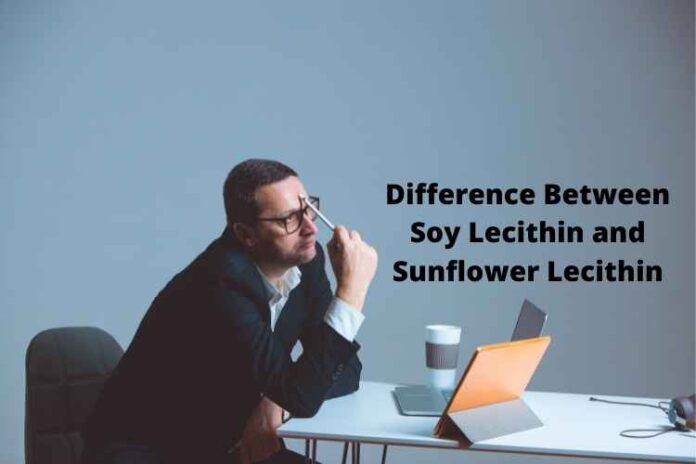In this blog we are going to tell you about Difference Between Soy Lecithin and Sunflower Lecithin, so read this blog carefully to get the complete information.
There are several food additives on the market that are intended to improve the flavor, texture, stability, and shelf life of the foods we buy at the supermarket. Soy lecithin and sunflower lecithin are two typical food additives found in popular foods such as chocolate bars, cake mixes, and sauces. These are fatty acids that are commonly used to emulsify (combine fat and water) components in meals, making them simpler to work with and extending food shelf life. So, what are these and how are these two different from each other? You will find the answer in this blog post.
RELATED – DIFFERENCE BETWEEN LEFT TWIX AND RIGHT TWIX: KNOW IN DETAIL
What is Lecithin?
Lecithin, also known as alpha-phosphatidylcholine, is an emulsifier and lubricant that is found in a range of foods, such as soybeans and sunflower seeds. Théodore Gobley, a French scientist and pharmacist, was the first to isolate it in 1845, and it is used in the food, pharmaceutical, cosmetic, and paint industries (Nguyen et al.). Lecithin is a kind of lipid present in every cell of the body. Glycerophospholipids such as phosphatidylcholine, choline, phosphatidylethanolamine, phosphatidylinositol, and phospholipids are found in lecithin. Egg yolk, sunflower, soybeans, milk, salmon, animal fat, canola seeds, and cotton seeds are all good sources of lecithin. Because of the numerous health advantages it gives, it is often incorporated into pharmaceuticals and food items. Bakers choose sunflower lecithin over soy lecithin because it is easier to work with, has fewer allergens, and is easier to store.
RELATED – TOP 10 FACTS ABOUT ARISTOTLE
Lecithin, according to WebMD, can aid in the treatment of lifestyle diseases such as high cholesterol, obesity, and depression. It also aids in the management of dementia and Alzheimer’s disease symptoms. Because phosphatidylcholine is the key dietary element in soy lecithin, it promotes brain function. It then becomes a component of the cell membrane, and the body breaks it down into choline, which is essential for brain health. Choline is critical for preventing memory loss in the elderly. Lecithin aids weight reduction by speeding up fat breakdown and increasing metabolism as a result. It works well as part of a balanced diet and as a weight-loss supplement. It regulates the flow of nutrients into and out of cells and breaks down fat deposits to avoid fat buildup around the heart, arteries, and brain.
Difference Between Soy Lecithin and Sunflower Lecithin
The main difference between soy lecithin and sunflower lecithin is that soy lecithin is extracted using chemicals like acetone and hexane, whereas sunflower lecithin is extracted using cold pressing and no chemicals. Lecithin is a fatty molecule found in plant and animal tissues that range in color from yellow to brown. Phosphatidylcholines, a significant component of lecithin, have a number of health advantages. It has the ability to decrease harmful cholesterol levels in our bodies. It can also enhance immunological function, reduce stomach discomfort, improve memory, aid brain growth, and help with nursing. Because soy lecithin is hydrophilic (loves water) and tends to clump when exposed to air, bakers prefer sunflower lecithin because it is simpler to work with and store. Because soy is an allergy and is more likely to be a GMO product, sunflower lecithin is considered the better option. As a result, lecithin may be extracted commercially from soybeans and sunflowers.


